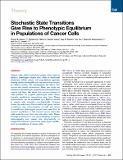Stochastic State Transitions Give Rise to Phenotypic Equilibrium in Populations of Cancer Cells
Author(s)
Fillmore, Christine M.; Jiang, Guozhi; Shapira, Sagi D.; Tao, Kai; Kuperwasser, Charlotte; Gupta, Piyush; Lander, Eric Steven; ... Show more Show less
DownloadGupta-2011-Stochastic State Tra.pdf (1.024Mb)
PUBLISHER_POLICY
Publisher Policy
Article is made available in accordance with the publisher's policy and may be subject to US copyright law. Please refer to the publisher's site for terms of use.
Terms of use
Metadata
Show full item recordAbstract
Cancer cells within individual tumors often exist in distinct phenotypic states that differ in functional attributes. While cancer cell populations typically display distinctive equilibria in the proportion of cells in various states, the mechanisms by which this occurs are poorly understood. Here, we study the dynamics of phenotypic proportions in human breast cancer cell lines. We show that subpopulations of cells purified for a given phenotypic state return towards equilibrium proportions over time. These observations can be explained by a Markov model in which cells transition stochastically between states. A prediction of this model is that, given certain conditions, any subpopulation of cells will return to equilibrium phenotypic proportions over time. A second prediction is that breast cancer stem-like cells arise de novo from non-stem-like cells. These findings contribute to our understanding of cancer heterogeneity and reveal how stochasticity in single-cell behaviors promotes phenotypic equilibrium in populations of cancer cells.
Date issued
2011-08Department
Massachusetts Institute of Technology. Department of BiologyJournal
Cell
Publisher
Elsevier
Citation
Gupta, Piyush B., Christine M. Fillmore, Guozhi Jiang, Sagi D. Shapira, Kai Tao, Charlotte Kuperwasser, and Eric S. Lander. “Stochastic State Transitions Give Rise to Phenotypic Equilibrium in Populations of Cancer Cells.” Cell 146, no. 4 (August 2011): 633–644. © 2011 Elsevier Inc.
Version: Final published version
ISSN
00928674
1097-4172